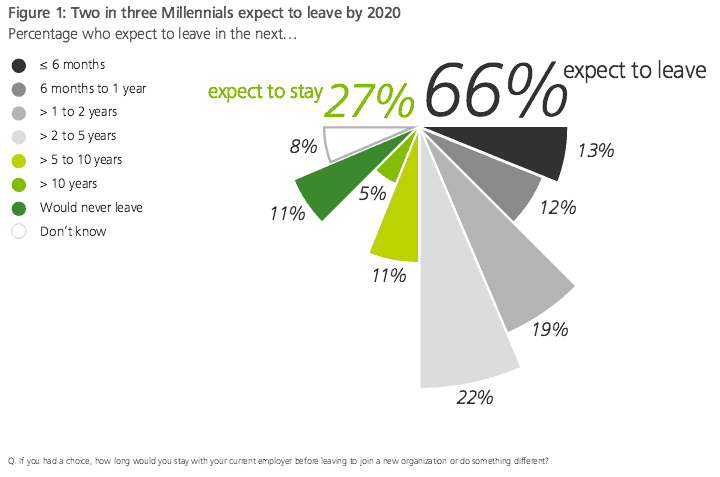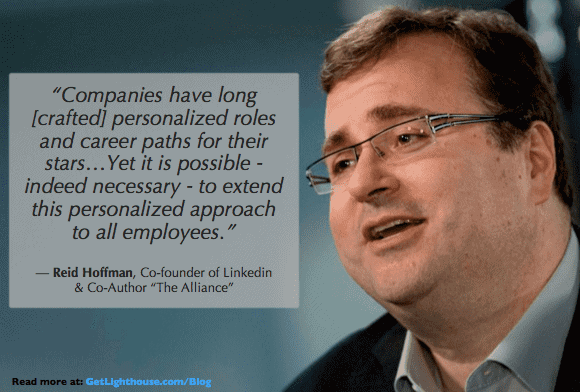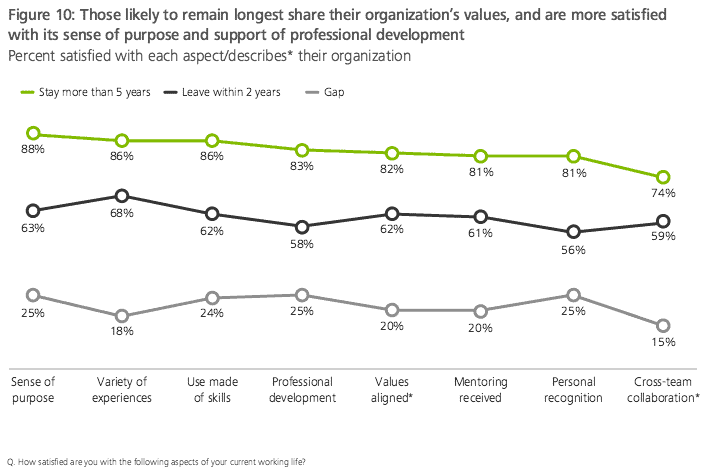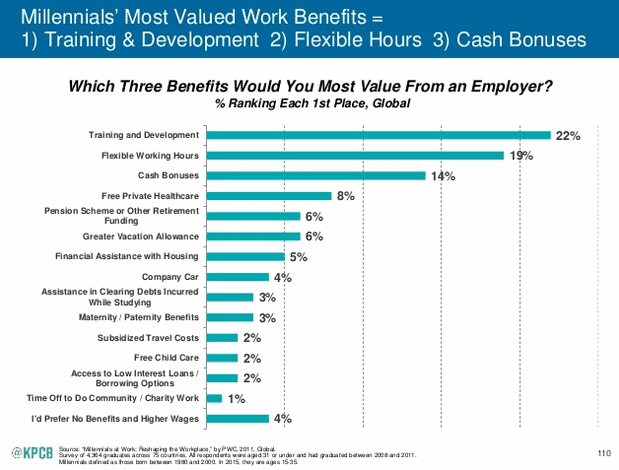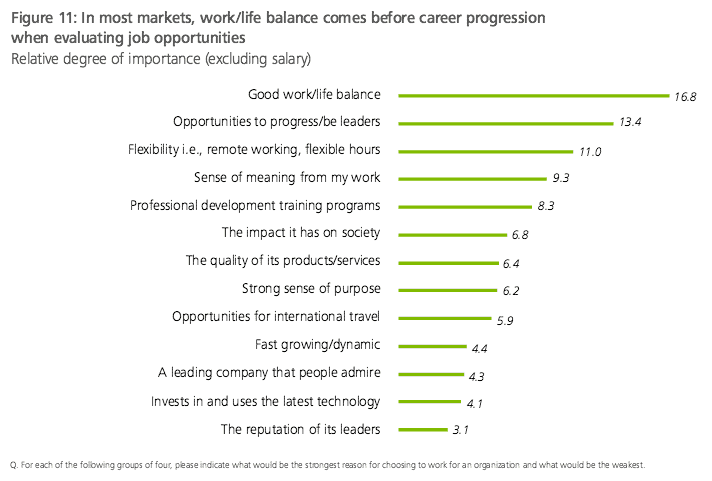A few times a year Deloitte and Gallup release studies that help reveal trends in the workplace. They can help us all be better leaders, and understand trends that we normally would not have a high level view of.
Few, if any, individual organizations have the resources, data sets, and commitment to gather statistically significant data on the workforce. Because of this, we're always excited here at Lighthouse when we see a new set of results published.
The latest Deloitte survey reveals several key trends in Millennials at work. The results are striking and critical for any leader interested in what motivates and retains Millennials. Read on for our our key takeaways and how it compares to other studies we've seen.
Key Takeaways from Deloitte's Survey of Millennials
If you're interested in the original report you can read or download Deloitte's Millennial Survey 2016 here.
1) "1 in 4 Millennials plan to quit their job in the next year."
Given the high cost to replace an employee (often over $60,000), retention is always on a good leader's mind.
The most revealing statistic in the Deloitte survey results is this harsh realization that so many Millennials are ready to move on from their current job.
Knowing that many Millennials are possibly on the move (or planning it soon), the question becomes: What is the cause? Deloitte's data revealed a few hints:
- "Regardless of gender or geography, only 28 percent of Millennials feel that their current organizations are making ‘full use' of the skills they currently have to offer."
- "71 percent of those likely to leave in the next two years are unhappy with how their leadership skills are being developed."
It appears reaching your full potential and feeling there are opportunities for growth play a big part in retaining employees. Reinforcing this sentiment, Deloitte reported that loyal employees are more likely to agree with these statements:
- "There is a lot of support/training available to those wishing to take on leadership roles"
- "Younger employees are actively encouraged to aim for leadership roles."
Reid Hoffman's statement in his book, The Alliance, rings even more true based on these findings by Deloitte:
Are you helping everyone in your company grow? If not, the most scalable way to ensure it happens is to look to your managers.
A manager is the person most likely to know the strengths, weaknesses, and interests of each member of their team. If they don't, this post can help with the discussion they should be having with everyone on their team as part of regular one on ones.
2) Millennial parents are more loyal
When combating retention and morale issues, it can be easy to add another perk; it's like a quick sugar rush when you're a little sleepy.
Rather than thinking about the next drink/snack/dart board/swag, it may be better to consider perks for parents. In Deloitte's survey, they found that Millennial parents are more loyal to their current jobs by a ratio of 4 to 3:
"Millennials who are parents show somewhat more loyalty than those without children; 32 percent of the former intend to remain with their current employers for five years or more, compared to 24 percent of the latter."
When considering the cost of replacing employees, and the value added by someone with knowledge over such a lengthy period of time, investing in parent-specific perks is a hidden opportunity.
Google's investment in parents.
Google decided to invest in parents at their company by changing their maternity leave policy. The story of the impact was reported in the book, Work Rules!: Insights from Inside Google.
When Laszlo Bock, head of Google's People Operations, looked at the data, he found that the turnover rate for mothers after childbirth was double the average for all Googlers. To combat this, Google extended their maternity leave from 3 months to 5 months, and included full salary and benefits during that time.
The results were dramatic. The turnover rate for mothers dropped to the same as all Googlers. Also, when they calculated all costs for the changed plan, it was still less than the costs of replacing and training a new hire for those they lost when attrition was double the average rate.
You can do this, too.
While others like Facebook have followed Google's lead, your company may not be able to afford to offer this kind of perk for parents. However, that does not mean you cannot offer other parent-friendly benefits like:
- Flexible work hours (so they can take care of a sick child, or work a more parent-friendly schedule).
- More comprehensive health insurance for dependents and spouses.
- Family friendly company events (whether due to scheduling by avoiding weeknights, or including their children)
There are likely many other potential parent friendly things you can do to take advantage of this more loyal group. All you have to do is take the time to ask them, and they are likely to tell you what could be fixed or added to your company's benefits.
3) How to retain Millennials
Knowing that 1 in 4 Millennials is making a move away from your company soon, the question becomes what to do about it? Deloitte's survey found a few telling statistics that you can act on.
1) Make sure your people have mentors and grow
Deloitte found mentorship was a key difference for those intending to stay at their company for the long haul:
"Those intending to stay with their organization for more than five years are twice as likely to have a mentor (68 percent) than not (32 percent)."
It makes sense, doesn't it? If you have a mentor, it means there is someone to help ensure your growth and talk about your career.
As we shared above, the lack of those topics being discussed is most common in those who will leave in the next 2 years.
There's only so long people want to do the exact same thing without growing and taking on new opportunities. This is especially true for your ambitious Millennials who could be rising stars in your organization if you invested in them.
Unfortunately, this level of support is rare as Deloitte found:
"It is likely no coincidence that where Millennials are most satisfied with their learning opportunities and professional development programs they are also likely to stay longer. It is, therefore, disappointing that less than a quarter (24 percent) of Millennials are "very satisfied” with this aspect of their working lives."
With so few Millennials "very satisfied" this creates an opportunity for your company to differentiate itself. Ask yourself: who can you mentor and how can you help more people in your company grow?
2) Those more likely to stay have consistently better work environments
Filed under "Captain Obvious" perhaps, it turns out those who would stay for over 5 years report greater satisfaction across a variety of areas:
Let's consider a few of the greatest gaps:
- Sense of Purpose: In the new world of creative knowledge work, Purpose is one of the 3 key areas for motivating employees according to Dan Pink's research. His TED Talk is a must watch on the subject.
- Professional Development: A theme throughout this study, and in many others is employees desire for growth. Yet, it's still not happening nearly often enough. This post on SmartBriefs on Leadership helps explain why and what to do about it.
- Personal Recognition: Praise, or its absence, has a huge impact on motivating employees. In just one example, a Gallup study found, "Employees who report that they're not adequately recognized at work are three times more likely to say they'll quit in the next year."
The common theme throughout all of these areas is that they require real effort on the part of you and the managers in your organization.
- Purpose: People do not find purpose on their own. Especially as your organization grows, it's easy to feel like your work lacks meaning. You have to show them how their work matters to their team and in the big picture.
- Growth: While perhaps some people will develop on their own, you would be doing so at a great risk; anyone willing to work alone on their development is also likely not afraid to look for growth opportunities at other companies.
- Praise: Praising people does not come naturally to most of us. It's a skill to develop and there are best practices for giving praise. Building the habit to do it well is valuable, but requires a thoughtful investment in doing so.
When would anyone have time to do all of this?!?
If your organization trains managers to have one on ones, then that's the perfect time to work on these areas. Don't let your managers waste their one on ones on status updates.
3) Look to what Millennials say they value most
While money is important to anyone looking for a job, you can learn a lot about people's motivations by seeing what's important after compensation.
In late 2015, Mary Meeker shared findings in her Internet Trends 2015 report from a similar survey of Millennials:
You can see the top few desired benefits are very similar to what this Deloitte survey found:
It's nice to know that there's a good amount of alignment between what people consider important in their job offers and what makes them stay at a job.
This means that if you do put in the effort to invest in the areas that the Deloitte survey shows improves retention, it should also help you with recruiting.
---
Whether this information confirms what you already knew, or provides new insights, I hope you'll consider making the effort to make improvements in some of these areas we've discussed.
The cost of retention from lost productivity, to training, to the distraction of a hiring process, all make the alternative (ongoing turnover) much worse than the medicine (making more investment in your current people).
So many companies say, "People are our greatest asset," but few take the action to mean it. Does your company? Do you?

